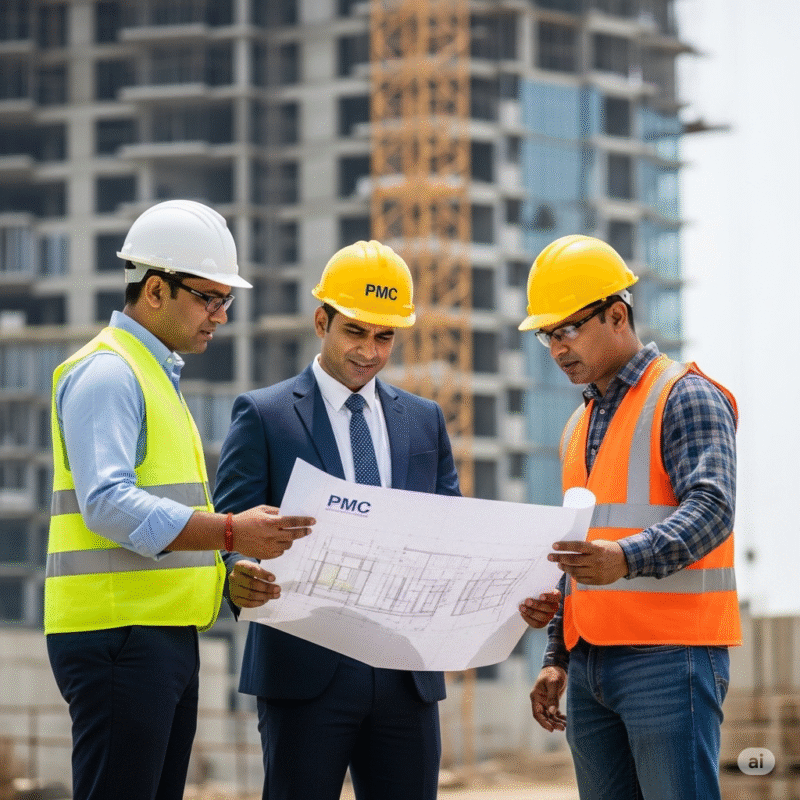Introduction
Project Management Consultancy (PMC) has become the backbone of successful real estate development in India. As construction projects grow more complex and regulatory requirements become stricter, working with the right PMC can make the difference between project success and costly delays.
Whether you’re a real estate developer managing multiple projects, an investor looking to build your dream home, or a construction professional seeking to understand PMC dynamics, this guide will equip you with essential knowledge to collaborate effectively with PMC consultants.
PMC services have proven crucial for projects worth over ₹50 crores and complex high-rise developments where coordination between multiple stakeholders, regulatory compliance, and quality control become challenging to manage independently. Understanding how to select, work with, and maximize the value of PMC services is essential in today’s competitive real estate market.

Understanding PMC Roles and Responsibilities
What is PMC?
Project Management Consultancy (PMC) differs significantly from traditional contractor responsibilities. While contractors execute specific construction tasks, PMC consultants provide comprehensive project oversight, coordination, and management services throughout the project lifecycle.
PMC acts as the client’s representative, ensuring project objectives are met within budget, timeline, and quality parameters. They bridge the gap between technical execution and business objectives, providing strategic guidance and operational oversight.
Types of Project Management Consultancy Services
PMC services typically fall into four main categories:
Design Management: PMC coordinates with architects, structural engineers, and MEP consultants to ensure design integration and compliance with local regulations. They manage design reviews, approval processes, and ensure RERA-compliant documentation.
Construction Management: This involves contractor supervision, quality audits, progress monitoring, and safety compliance. PMC ensures adherence to IS codes and conducts weekly material and structural checks.
Financial Management: PMC provides budget control, payment certification, and escrow account monitoring. They ensure 70% of funds are used for construction as per RERA requirements and maintain monthly cost tracking against Bill of Quantities (BOQ).
Handover Management: PMC manages snagging lists, secures Occupancy Certificates (OC), and establishes warranty management systems for tracking 5-year structural defects.

When to Hire a Project Management Consultancy
PMC services become essential for projects exceeding ₹50 crores or complex high-rise developments involving multiple towers, mixed-use components, or intricate MEP systems. Projects requiring extensive regulatory approvals, those with tight timelines, or developments in new geographical markets also benefit significantly from PMC expertise.
Key Methodologies and Processes
Step-by-Step PMC Execution
The PMC process begins with comprehensive project assessment and feasibility studies. PMC conducts market analysis, financial viability assessment, and regulatory compliance review to establish project parameters.
During pre-construction, PMC coordinates design development, manages approval processes including NOCs from Fire, Pollution, and Municipal authorities, and assists in contractor selection through structured tender evaluation.
Construction phase involves implementing 4D BIM coordination for timeline adherence, conducting weekly quality audits, ensuring safety compliance with proper PPE and scaffolding standards, and maintaining progress tracking through Gantt charts and project management software.
IS Codes and International Standards
PMC ensures compliance with relevant Indian Standards including IS 456 for concrete structures, IS 800 for steel structures, and IS 1893 for earthquake-resistant design. They also coordinate compliance with National Building Code (NBC), Fire Prevention and Fire Safety provisions, and local development control regulations.
For international projects or premium developments, PMC may implement international standards such as LEED, BREEAM, or local green building certifications like IGBC and GRIHA.
Best Industry Practices
PMC implements proven methodologies including Building Information Modeling (BIM) for clash detection between MEP and structural elements, drone and IoT technology for progress and safety monitoring, and comprehensive risk management frameworks.
Regular stakeholder coordination through fortnightly builder-PMC meetings with documented action points ensures transparent communication and timely decision-making.
Material and Manpower Requirements
Typical Materials and Quality Standards
PMC oversees procurement of materials meeting IS code specifications including cement (IS 269), steel reinforcement (IS 1786), and concrete blocks (IS 2185). They ensure material testing and certification, maintaining traceability for quality assurance.
Advanced projects may require specialized materials for energy efficiency, acoustic insulation, or aesthetic requirements, which PMC coordinates with suppliers and ensures proper installation.
Labor and Machinery Requirements
PMC assists in identifying skilled workforce partners to address labor shortages and ensures proper training programs for specialized tasks. They coordinate machinery requirements including tower cranes, concrete pumps, and finishing equipment based on project specifications.
Safety training and PPE provision are managed through PMC protocols, ensuring compliance with Factories Act and local safety regulations.
Deliverables at Each Stage
Pre-Construction Deliverables
PMC provides comprehensive feasibility reports including market analysis, financial projections, and regulatory compliance assessment. Design coordination reports ensure architect-PMC collaboration for RERA-compliant plans and approval management documentation.
Contractor evaluation reports with tender analysis and recommendation support informed decision-making for construction partner selection.
Construction Stage Deliverables
Monthly progress reports include 4D BIM updates, quality audit findings, safety compliance status, and financial tracking against approved budgets. Weekly inspection reports document material testing results, structural compliance, and corrective action requirements.
Payment certification documents ensure proper fund utilization and maintain escrow account compliance as per RERA requirements.
Post-Construction Deliverables
Comprehensive snagging lists ensure defect-free handover with documented remedial actions. OC and compliance documentation includes all necessary certificates for legal occupancy.
Warranty management systems track 5-year structural defects and establish maintenance protocols for ongoing building performance.
Stakeholders and Communication Matrix
Key Players and Roles
Primary stakeholders include developers as project owners, PMC as management consultants, architects for design leadership, contractors for execution, and government authorities for regulatory approval.
Secondary stakeholders encompass financial institutions for funding oversight, material suppliers for quality compliance, and end-users for requirement validation.
Communication Protocols
PMC establishes structured communication through fortnightly review meetings with documented minutes and action items. RERA-mandated progress reports keep buyers informed of construction status and milestone achievements.
Monthly financial reviews ensure budget adherence and early identification of cost variations requiring management attention.
Value Engineering Opportunities
Cost-Saving Techniques
PMC identifies value engineering opportunities through alternative material specifications, construction methodology optimization, and design efficiency improvements. They recommend cost-effective solutions without compromising structural integrity or aesthetic requirements.
Bulk procurement strategies and vendor partnerships facilitated by PMC can achieve significant cost savings while maintaining quality standards.
Sustainable Alternatives
PMC promotes sustainable construction practices including recycled materials usage, energy-efficient building systems, and water conservation measures. They guide IGBC or GRIHA certification processes for projects targeting green building standards.
Implementation of renewable energy systems, rainwater harvesting, and waste management protocols adds long-term value while potentially qualifying for government incentives.
Case Study: Lodha Group Mumbai Project Success
Project Overview
Lodha Group’s premium residential project in Mumbai faced challenges with multiple tower coordination, complex MEP integration, and tight delivery timelines for pre-sold units.
Challenges and PMC Solutions
The project experienced initial delays due to design coordination issues between architectural and structural elements. PMC implemented comprehensive BIM coordination, identifying and resolving over 200 design clashes before construction commenced.
Labor availability issues during monsoon periods were addressed through PMC’s recommended workforce partners and weather-contingent scheduling modifications.
Results and Key Takeaways
PMC intervention reduced overall project delays by 20%, achieved cost savings of 8% through value engineering, and maintained zero safety incidents throughout construction. The systematic approach to stakeholder coordination and proactive risk management proved crucial for project success.
The project achieved RERA compliance ahead of schedule and received positive customer satisfaction ratings for construction quality and timely delivery.
Risks and Mitigation Strategies
Common Project Risks
Typical risks include monsoon-related delays, labor shortages, material cost escalations, and regulatory approval delays. PMC develops comprehensive risk registers identifying probability and impact assessments for each potential issue.
Financial risks such as cost overruns and payment delays require proactive monitoring and mitigation through escrow account management and progress-linked payment schedules.
Preventive Measures
PMC implements early warning systems for risk identification, maintains contingency planning for critical path activities, and establishes alternative supplier networks for material continuity.
Regular third-party audits validate PMC performance and provide independent assessment of project progress and risk management effectiveness.
Technology Integration in Project Management Consultancy Services
BIM Coordination and Digital Tools
Modern PMC services leverage 4D BIM for comprehensive project visualization, clash detection, and progress monitoring. Integration with project management software like Primavera, Procore, or MS Project ensures real-time data sharing and collaborative planning.
Drone surveys provide accurate progress documentation while IoT sensors monitor concrete curing, structural performance, and environmental conditions.
Future Trends
Artificial Intelligence integration enables predictive analytics for risk management and resource optimization. Blockchain technology offers tamper-proof documentation for contracts, approvals, and quality certifications.
Virtual and Augmented Reality tools enhance stakeholder communication and enable remote project monitoring capabilities.
Selecting the Right PMC Partner
Credential Verification
Essential PMC credentials include RERA registration, ISO 9001 certification, and relevant industry certifications. Verification of past project portfolio in similar segments ensures appropriate experience for your project requirements.
Team expertise assessment should confirm local regulatory knowledge including NBC compliance, fire safety norms, and state-specific development control regulations.
Fee Structures and Contract Terms
PMC fees typically range from 2-5% of project cost, structured as either fixed fees or percentage-based arrangements. Clear Scope of Work (SOW) definition prevents disputes over deliverables and responsibilities.
Liability clauses addressing penalties for delays or cost overruns protect client interests while exit clauses provide flexibility for performance-based contract management.
Project Management Consultancy Best Practices for Indian Projects
Local Knowledge and Compliance
Understanding state-specific bylaws such as Maharashtra’s UDCPR (Unified Development Control and Promotion Regulations) ensures regulatory compliance and approval efficiency.
PMC maintains updated knowledge of changing regulations, environmental clearance requirements, and local authority procedures for seamless project execution.
Transparency and Reporting
Shared digital dashboards provide real-time project updates accessible to all stakeholders. Regular reporting cycles maintain transparency and enable proactive decision-making for emerging issues.
Documentation management ensures audit trail compliance and supports dispute resolution when required.
Future of Project Management Consultancy Services
Emerging Technologies
Integration of Artificial Intelligence for predictive project analytics, automated progress monitoring, and resource optimization represents the next evolution in PMC services.
Blockchain-based smart contracts ensure automated compliance verification and payment processing based on milestone achievements.
Industry Evolution
PMC services are expanding into comprehensive asset management, including post-construction facility management and lifecycle cost optimization.
Sustainability consulting and green building certification guidance are becoming standard PMC offerings as environmental consciousness drives market demand.
Conclusion
Working effectively with PMC consultants requires understanding their role, selecting qualified partners, establishing clear contracts, and maintaining collaborative relationships throughout project execution. The investment in professional PMC services typically yields significant returns through reduced delays, cost optimization, quality assurance, and regulatory compliance.
Success depends on choosing PMC partners with appropriate credentials, relevant experience, and local market knowledge. Clear communication protocols, regular performance monitoring, and collaborative problem-solving ensure project objectives are achieved within budget and timeline constraints.
As the real estate industry continues evolving with new technologies and regulations, PMC services will remain essential for managing complexity and delivering successful projects. Early engagement with qualified PMC consultants sets the foundation for smooth project delivery and stakeholder satisfaction.
For developers, investors, and construction professionals, understanding PMC dynamics and implementation best practices provides competitive advantages in today’s challenging market environment. The systematic approach outlined in this guide offers a roadmap for successful PMC collaboration and project success.
External Resources:
- Ministry of Housing and Urban Affairs – Model Building Bylaws
- Indian Green Building Council Certification Process
- Bureau of Indian Standards – Construction Codes




